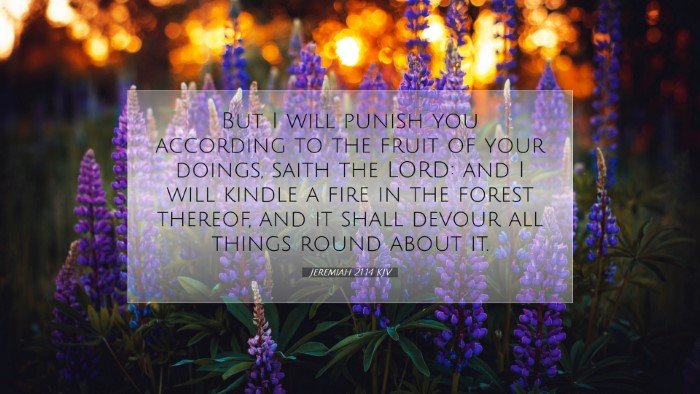Commentary on Jeremiah 21:14
Verse: "But I will punish you according to the fruit of your doings, saith the Lord: and I will kindle a fire in the forest thereof, and it shall devour all things round about it." (Jeremiah 21:14, KJV)
Introduction
This verse from the prophet Jeremiah captures the essence of divine justice and the consequences of sin. It is a part of the larger discourse where Jeremiah warns Judah of impending doom due to their blatant disobedience and moral decay. The insights from public domain commentaries reveal the multifaceted dimensions of God's judgment intertwined with mercy, righteousness, and the impending consequences of one's actions.
Exegesis of the Verse
Jeremiah's Context: The Book of Jeremiah is set during a tumultuous period leading to the Babylonian exile. Jeremiah, known as the weeping prophet, conveys God's messages about judgment and restoration. This particular verse signifies a pivotal moment where the fate of Jerusalem is profoundly announced.
Divine Punishment: Matthew Henry states that the phrase "I will punish you according to the fruit of your doings" emphasizes the principle of retribution. Every action has its consequences, a law not only rooted in divine justice but discernible in natural order as well. Henry highlights that God's punishment is neither arbitrary nor cruel; it is a direct response to the nation's persistent transgressions.
Metaphor of Fire: The imagery of fire further intensifies the message. Adam Clarke elaborates on the connotation of fire in scripture. Fire symbolizes destruction but also purification. God’s fire here is a metaphor for the devastation that will engulf Jerusalem, representing both judgment and an opportunity for renewal through repentance. Clarke mentions that the forest imagery signifies the extensive reach of God's judgment, indicating that no one is exempt from the consequences of collective sin.
Theological Implications
Justice and Mercy: Albert Barnes emphasizes a theological balance in this verse, reflecting both God's justice and His mercy. Though punishment is proclaimed, it carries an underlying call for repentance. The warnings of the prophets serve to influence and lead the people back to God; therefore, punishment should not solely be perceived as retribution but as a means of correction intended to restore the relationship between God and His people.
Human Responsibility: This scripture clearly asserts human responsibility in the face of divine authority. The expression "according to the fruit of your doings" indicates that individuals and communities are accountable for their actions. Clarke notes that this accountability remains relevant across ages, emphasizing that leaders and citizens must always consider the moral implications of their choices, as they directly affect communal wellbeing.
Practical Applications
-
Reflection on Personal Conduct:
Individuals are encouraged to regularly evaluate their actions and align them with God’s principles. The promise of divine retribution stimulates a more profound understanding of community ethics and personal integrity.
-
Pastoral Counseling:
For pastors, this passage provides a basis for discussing tough topics like judgment and sin. It opens opportunities for pastoral care that focuses on guidance toward repentance rather than merely on the consequences of actions.
-
Encouragement for Repentance:
This verse encourages believers to embrace the call for repentance, understanding that God’s justice aims at restoration and not solely punishment. It invites congregations to engage in communal prayers for forgiveness and restoration.
Conclusion
Jeremiah 21:14 stands as a significant reminder of God's unwavering justice intertwined with His boundless mercy. Through the critique of social and communal sin, believers are reminded of their responsibility towards righteous living. The insights derived from Matthew Henry, Albert Barnes, and Adam Clarke converge to illuminate the rich texture of divine truth that characterizes God's dealings with humanity. Ultimately, this verse serves as a call to heed God’s warnings with sincere hearts, fostering a culture of accountability, repentance, and renewal within the faith community.


